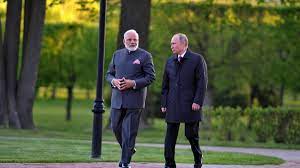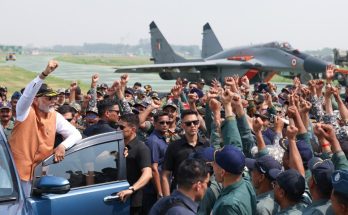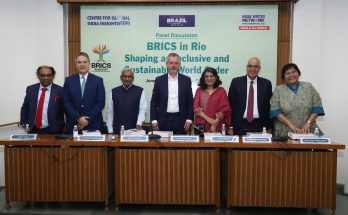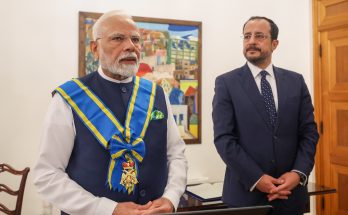By D. B. Venkatesh Varma
The Ukraine conflict also had a negative impact on the developmental agenda of the Global South due to the disruption of fuel, fertilizer, and food supplies. The G20 can either get bogged down with conflicts amongst a few or move forward towards more productive outcomes that would benefit humanity. India has made a clear choice in favour of the latter, says D. B. VenkateshVarma

As host of the G20 Leaders Summit to be held in New Delhi on September 8-9, 2023, Prime Minister Narendra Modi will be welcoming world leaders as they gather for one of the most significant diplomatic events of the year. India’s presidency has already broken numerous records in terms of the preparatory process for the G20 in general or for that matter other comparable multilateral events in particular along the three tracks of the Sherpas, Finance, and the Engagement groups which have covered areas ranging from Civil Society, Labour, Parliamentary Contacts, Science, Startups, and Global Think Tanks. With the theme of “VasudhaivaKutumbakam”, or “One Earth, One Family, One Future”, which affirms the interconnectedness of Planet Earth in the wider universe, India has elevated the vision of the G20 as never before. As directed by Prime Minister Modi the preparatory process for the Summit has taken the extraordinary step of organizing meetings in all states of the country with a specific people-connect focus so much so that India’s presidency is not just an event in international diplomacy but has become a household name in far-flung corners of the country. This new revolution in diplomacy, with an active international dimension and vibrant internal dimension, has not been seen before.
Ukraine Dilemma
The G20 Summit will be taking place against the background of unprecedented global changes. The G20 as a grouping was conceived at a time of the financial crisis in 2008 as a dialogue forum for promoting understanding and taking common or coordinated action on specific financial and trade issues. It was not intended to be a forum for addressing bilateral or international security issues. Besides, some of the key members of the G20 had pre-existing forums for addressing these issues such as the G7. The G20 has had a good track record of productive outcomes on the issues of its original mandate – in addressing the global fallout of the 2008 financial crisis. India was keen to preserve the original mandate of the G20.
The outbreak of the Ukraine conflict in February 2022 deepened the divisions in the international community, between Russia on the one hand and the G7 on the other. The commencement of military hostilities and the imposition of unilateral sanctions by the US and its allies had the further effect of paralyzing the United Nations Security Council and other UN bodies which have the primary responsibility for the maintenance of international peace and security. The Ukraine conflict also had a negative impact on the developmental agenda of the Global South due to disruption of fuel, fertilizer, and food supplies which further exacerbated the precarious economic, social, and debt servicing conditions of many developing countries. However, at the insistence of the G7 an unfortunate precedent was created in the Bali Declaration of the G20 Summit in 2022 of including paragraphs of a political nature in the summit document. This enabled consensus in the Bali Summit but it was an outcome that only sharpened divisions amongst the G20 countries as to the real purpose and meaning of the grouping.
Bali Summit and Legacy
It was against this background that India took over the presidency in 2023 and was immediately faced with the headwinds of the international situation and the legacy of the Bali Summit. India has a well-articulated position on the Ukraine conflict, notably through Prime Minister Modi’s call that “this is not an era of war” as communicated during his meeting with President Putin in Samarkand in 2022. However, as the host country India had an added responsibility to build consensus considering the various and sometimes sharply differing views of members, fulfilling one of the key tasks of its presidency, which is to promote dialogue and find common ground. While the G7 wanted reiteration of the condemnation of Russia as in the Bali Declaration, Russia argued that the conflict situation had changed considerably since the last summit and hence that formulation was not acceptable. Various formulations have been under consideration, though in the final analysis the issue is not so much of language as the political will for mutual accommodation which, unfortunately, has been lacking. While there have been several peace proposals, none of them has elicited a positive response from the all the stakeholders. The two countries directly involved are Russia and Ukraine, where the former is a member of the G20, and the latter is not. Neither has expressed readiness to engage in direct dialogue in recent months. In fact, Ukraine has a legislation that prohibits dialogue with President Putin. With prospects for peace in the Ukraine conflict still in the future, given the still-evolving military situation, it would be counterproductive for the concerned countries, particularly those of the G7, to bring matters to a head in the G20 Summit, especially when there has not been a single peace proposal offered from any of the G7 countries which are in the G20.
Against this background of such deep geopolitical splits, India’s G20 team headed by its Sherpa Amitabh Kant as well as those representing India at the ministerial level exerted vigorous effort to promote dialogue and consensus. Even though consensus was elusive on a few points, agreement was reached on a vast majority of substantive issues in the six priority areas – Sustainable Development Goals (SDGs), Green Development, Multilateral Development Banks, Digital Public Infrastructure, and Gender Equality. The common ground attained in the G20 will reinforce at the global level efforts to address challenges that concern all humanity with focus on development and growth, climate change and Prime Minister Modi’s unique formulation of Lifestyles for Sustainable Development (LiFE). In so doing, the developmental imperative of the G20 has been further reinforced during the Indian presidency of the G20.

The Virtual Summit
The substantive content of the G20 outcome document has been enriched by the unprecedented move by Prime Minister Modi to host in January 2023 a virtual summit of developing countries to impart a distinct Global South imprint on the G20 proceedings. This has not only changed the center of gravity within the G20, which tended to favour the G7, towards non-G7 members but also brings the G20 in line with the general trend of multipolarity now evident in the international system. A momentous development in promoting inclusivity is India’s proposal to include the African Union (AU) in the G20. With its 55 members, the AU’s inclusion after a formal decision at the Delhi Summit would help not only in consolidating India’s traditionally friendly relations with countries of the African Continent but also amplify voices of the Global South at global forums. At a time of great power conflict and numerous global challenges, the success of India in preserving the G20 as a platform for dialogue on key issues, with the participation of key countries of the G7, Russia and China are noteworthy. India’s Sherpa’s call that the G20 is a development forum and not a forum for political conflict has resonated well among the G20 members. The value of the G20 as a forum for bringing together developed and emerging economies is now widely recognized. The latter have interests and priorities that are distinct from the G7 or Russia and China and cannot allow the G20 to be taken hostage by conflicts they are not involved with. They don’t wish to continue to suffer the negative consequences of a European conflict with global ramifications. The only way the G20 can get involved is on the side of peace, dialogue, and diplomacy. That has been India’s national position from the commencement of the Ukraine conflict and has been maintained during the Sherpa dialogue process.
Need For Consensus
While the Leaders Declaration is yet to be finalized, its final shape will be responsibility of the G20 as a whole and not just the Chair. It is widely recognized that India as the Chair left no stone unturned to find the consensus and had performed an outstanding job of drafting an inclusive, ambitious, decisive, and action-oriented Leaders Declaration to be issued at the September Summit. The overall momentum is for a positive outcome and if any member or group of members wish to break consensus, the onus of responsibility for the future viability of the G20 as a group will rest squarely on their shoulders. The G20 can either get bogged down with conflicts amongst a few or move forward towards more productive outcomes that would benefit humanity. India has made a clear choice in favour of the latter and in doing so has shown vision and leadership not only of the Global South but at the global level. Therefore, while we have every reason to expect a successful G20 Summit, India’s global standing has been assured by its hosting of the G20 Summit. This would be remembered as a major milestone in India’s diplomatic history and a turning point in our international engagement. At a time when geopolitics threatened to disrupt the international agenda, India’s leadership of the G20 at a crucial time has resulted in not only the development agenda being preserved but also strengthened in the face of grave geopolitical disturbances. Crucially, the character of the G20 has changed from a grouping dominated by G7 concerns to one that is now better prepared to address a more equitable international cooperative agenda that is sensitive to the interests of the Global South. At a time when many multilateral institutions have fallen victim to geopolitical conflicts, preserving the original agenda of the G20 as an effective, inclusive, and action-oriented international forum would be a lasting contribution and legacy of India’s Presidency of the G20 in 2023.
D.B. VenkateshVarma is Distinguished Fellow of the Vivekananda International Foundation and Co-Chair of the Think7 Task Force on Multilateralism in the Think Twenty (T20) Engagement Group.
Author Profile
- India Writes Network (www.indiawrites.org) is an emerging think tank and a media-publishing company focused on international affairs & the India Story. Centre for Global India Insights is the research arm of India Writes Network. To subscribe to India and the World, write to editor@indiawrites.org. A venture of TGII Media Private Limited, a leading media, publishing and consultancy company, IWN has carved a niche for balanced and exhaustive reporting and analysis of international affairs. Eminent personalities, politicians, diplomats, authors, strategy gurus and news-makers have contributed to India Writes Network, as also “India and the World,” a magazine focused on global affairs.
Latest entries
 India and the WorldJune 26, 2025Operation Sindoor: India Sheds Restraint, Rediscovers Utility of Force
India and the WorldJune 26, 2025Operation Sindoor: India Sheds Restraint, Rediscovers Utility of Force India and the WorldJune 23, 2025BRICS summit in Rio to focus on Global South, local currency trade
India and the WorldJune 23, 2025BRICS summit in Rio to focus on Global South, local currency trade Africa InsightsJune 11, 2025New Opportunities in India-Japan Cooperation in Africa
Africa InsightsJune 11, 2025New Opportunities in India-Japan Cooperation in Africa India and the WorldMay 23, 2025Post-Operation Sindoor, India reminds Turkey, China of concerns and sensitivities
India and the WorldMay 23, 2025Post-Operation Sindoor, India reminds Turkey, China of concerns and sensitivities







